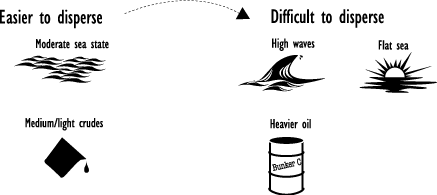7. What Constraints Affect Dispersant Use?
The effectiveness of a given dispersant depends on the type of oil spilled (it is easier to disperse lighter oils), weather conditions, and how quickly dispersants can be applied once oil has spilled. Dispersants must mix with the oil and water, so some energy is required for effective dispersion. But too much wind and wave energy may result in conditions that are dangerous for flying aircraft and that make it difficult to target the oil and properly apply the right amount of dispersant. Heavier oils or highly emulsified oils (oils that have mixed with water to form a heavy froth) are less amenable to successful dispersion, although research on new types of dispersants is attempting to address this problem.

This graphic contrasts the kinds of conditions under which dispersants are likely to be more effective (shown on the left) with the kinds of conditions under which it's harder to disperse oil (shown on the right).

Last updated
Tuesday, May 29, 2012 11:03am PDT
 An official website of the United States government.
An official website of the United States government. 